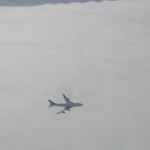Qantas and the University of Tasmania today awarded two scholarships totalling $30,000, to support vital research into the Tasmanian Devil Facial Tumour Disease.
The scholarships are part of a two-year $60,000 sponsorship program by Qantas in support of the Tasmanian Devil Facial Tumour Disease Program, which aims to find out more about the disease and how best to save the species from an uncertain future.
Scholarships have been awarded to two university PhD students:
Nick Beeton, an indigenous Tasmanian who will study local wild Tasmanian Devil
populations and disease modelling; and
Alex Kreiss, an Australian-based Brazilian student who will research the immune
responses of the Tasmanian devil.
Qantas Group General Manager Sales and Distribution, Mr Rob Gurney, said research into the disease afflicting the Tasmanian devil was vital to ensuring the species’ long term survival.
“Qantas is supporting the program in a number of ways, but most important is the funding of these two Qantas Research Scholarships at the University of Tasmania,”
Mr Gurney said.
Dean of the UTAS Faculty of Science, Engineering and Technology and Chair of the Tasmanian Wildlife Research Advisory Committee, Professor Jim Reid, said the support of Qantas was a crucial contribution towards determining strategies that would ensure the long-term survival of this iconic species in the wild.
“Present indications are that if no action is taken, devils may become extinct in the wild. This would have potentially catastrophic ecological impacts as other pest
species, such as feral cats and possibly foxes, take over the ecological niches released,” he said.
Qantas’ support for the Tasmanian Devil Facial Tumour Disease Program began in September 2006 and has already involved:
Qantas and Australian air Express assisting with the transport of 50 healthy devils
from Tasmania to mainland wildlife parks as part of a program to ensure a healthy
breeding population was established away from the threat of disease;
producing and airing inflight television commercials to raise public awareness of
the issue; and
funding the placement of coin donation sculptures across Tasmanian Parks and Wildlife visitor centres as in airport terminals in Sydney, Melbourne, Hobart and
Launceston which have collected around $20,000 in public donations for the cause.
Public support for the Tasmanian devil appeal can be given at www.tassiedevil.com.au






